What's New
Displaying results 2431 - 2440 of 4052
Resource | Presentations,
Get an overview of the HIV/AIDS situation for Seafarers and Port Workers in the Asia-Pacific region. Browse and view charts and graphs illustrating data on this population's HIV prevalence and epidemiology, risk behaviors, vulnerability and HIV knowledge, and national response.
Resource | Presentations,
Get an overview of the HIV/AIDS situation for Uniformed Personel in the Asia-Pacific region. Browse and view charts and graphs illustrating data on this population's HIV prevalence and epidemiology, risk behaviors, vulnerability and HIV knowledge, and national response.
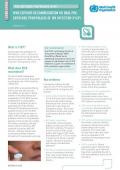
Resource | Fact Sheets,
Oral PrEP containing tenofovir disoproxil fumarate (TDF) should be offered as an additional prevention choice for people at substantial risk of HIV infection as part of combination HIV prevention approaches.
In 2014 WHO recommended offering PrEP to men who have sex with men. On the basis of further evidence of the effectiveness and acceptability of PrEP, WHO has now broadened the recommendation to include all population groups at substantial risk of HIV infection.
Offering PrEP should be a priority for populations with an HIV incidence of about 3 per 100 person-years or higher. PrEP should be an additional prevention choice in a comprehensive package of services that also includes HIV testing, counselling, male and female condoms, lubricants, ARV treatment for partners with HIV infection, voluntary medical male circumcision and harm reduction interventions for people who use drugs.
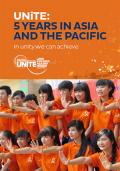
Resource | Publications,
Violence against women and girls (VAWG) occurs in the family, the community, society and across borders. It takes many forms, from domestic violence, trafficking and rape – in urban and rural areas, in refugee camps and as a tactic of war – to harmful practices such as child and forced marriage, "honour" killings, dowryrelated violence and prenatal sex selection.
In addition to the severe and multiple physical, sexual and psychological impacts on women and girls themselves, VAWG also harms families and communities across generations and carries significant economic costs. Violence can also limit women's ability to protect themselves from HIV, while women living with HIV/AIDS are often the target of abuse, stigma and discrimination. An expression of unequal gender power relations and men’s domination and control over women, VAWG is both a manifestation of gender discrimination and inequality and a tool with which such discrimination is perpetuated.
The UNiTE campaign calls on all governments, civil society, women's organizations, men and
boys, young people, the private sector, the media, and the whole UN System to come together in
addressing the endemic violence committed against women and girls around the world.
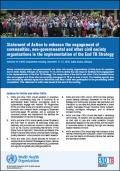
Resource | Tools,
The Statement of Action is the product of a preceding WHO TB Consultation held in Addis Ababa on 11 to 13 November, 2015. The consultation brought together 90 NGOs and other CSOs, along with national TB programmes and donors, to dialogue and share best practices, innovative approaches, challenges and opportunities in their community-based activities within and beyond TB care and health. The participants explored concrete ways in which they could work together, alongside governments and other partners, to ensure effective implementation of the WHO End TB Strategy. The meeting agenda was also informed by detailed inputs from 400 NGOs and other CSOs who participated in an advance online consultation.
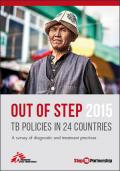
Resource | Publications,
The 2015 Out of Step report presents the results of a survey of 24 countries conducted by Stop TB
Partnership and Médecins Sans Frontières (MSF). Building on the previous Out of Step report, this year's survey tracked adoption of the latest TB policies, guidelines and tools across five areas: diagnosis and drug resistance testing; drug-sensitive TB (DS-TB) treatment regimens; MDR-TB treatment regimens; models of care; and regulatory frameworks. The results of this survey provide a snapshot of the world’s readiness to defeat the TB epidemic. Although effectively implemented policies and guidelines alone will not be sufficient, they form the foundation for a strong and comprehensive TB response that leaves no one with TB behind.
While this report is not a comprehensive or authoritative assessment of countries' national TB policies, it provides an indication of the level of preparedness to implement and scale up action. The results of the survey show that many countries need to take bold steps to bring their policies up to date with the latest international standards. There is a greater need to use rapid molecular tests for diagnosis of TB and drug resistance and to reduce out-of-pocket expenses for people with TB. This, coupled with innovative approaches to active case finding, will help reach the nearly 4 million with TB missed by health systems each year.
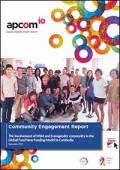
Resource | Publications,
The Global Fund's New Funding Model contains a country dialogue process which is a significant opportunity for key affected population including MSM and transgender organizations to meaningfully involve in all the stages, and engage with several Global Fund personalities. However, the complexity of the model poses a challenge to the communities and civil society organizations to know when and how they can best participate. This limited substantial knowledge on the process may create gaps in their engagement. The engagement of key affected population which includes MSM and Transgender was defined by a meaningful participation in an ongoing and consultative process of the country dialogue.
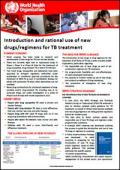
Resource | Fact Sheets,
- Much progress has been made in research and development of new drugs for TB over the last decade.
- There are currently eight new or repurposed drugs in Phase I, Phase II or Phase III trials for the treatment of drug-susceptible, drug-resistant TB or latent TB infection.
- Two novel drugs, bedaquiline and delamanid, have been approved by stringent regulatory authorities under accelerated or conditional approval procedures for the treatment of MDR-TB as part of combination therapy for adults with pulmonary TB when other alternatives are not available.
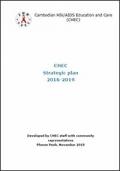
Resource | Publications,
This document is the sixth strategic plan for the Cambodian HIV/AIDS Education and Care (CHEC), representing its sixth cycle of positive intervention in the lives of people living with HIV and AIDS and their families. The CHEC programme currently consists of four projects: the Gender-Based Violence (GBV) Project, Out of School Youth Project, Home-Based Care Project and Nutrition project.
Due to the recent shift of funding support from donor countries, and due to the fact that the HIV/AIDS infection prevalence rate in Cambodia has been significantly reduced to 0.6% in 2015, this strategic plan reflects the shift to focus on ongoing life-time support for people living with HIV/AIDS.
For CHEC, the period 2016 to 2019 is an exciting time of growth, learning, embracing new challenges, and continuing to positively impact the lives of PLHIV. CHEC can indeed be an
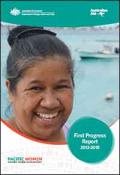
Resource | Publications,
This is the first progress report of Pacific Women Shaping Pacific Development (Pacific Women), which provides a snapshot of the program’s achievements and challenges in its first three years of operation. All 14 Pacific Islands Forum countries have received some form of support through Pacific Women.
While the Pacific region is vast and culturally diverse, Pacific Island countries share common challenges related to gender inequality: violence against women is widespread; women’s participation in political leadership is among the lowest in the world; and there are multiple barriers to economic participation and empowerment of women. Indeed, gender inequality poses a significant development challenge for Pacific Island countries.
In response to this challenge, the Australian Government established Pacific Women, a 10 year $320 million initiative that aims to support women – regardless of their income, location, disability, age or ethnic group – in 14 Pacific countries to participate fully, freely and safely in political, economic and social life. Pacific Women supports countries to meet the commitments made in the 2012 Pacific Islands Forum Leaders’ Gender Equality Declaration (refer Annex A). Pacific Women is managed by the Australian Department of Foreign Affairs (DFAT) in Canberra and Offices in the Pacific.





